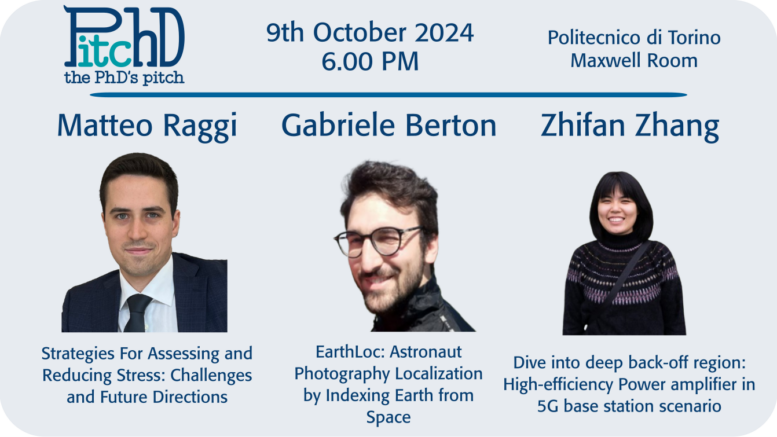9th October 2024 – 6.00 PM
Politecnico di Torino – Maxwell Room
Here’s the 3rd PitchD – the PhD’s pitch. Our PhD IEEE Student Members explain to students, colleagues and professors their research in-presence. Please, remember that registration is required to attend the event.
Strategies For Assessing and Reducing Stress: Challenges and Future Directions
Mr. Matteo Raggi
Dept. of Department of Electronics and Telecommunication Engineering, Politecnico di Torino
Biography: Matteo Raggi received the B.Sc. and M.Sc. degrees in biomedical engineering from Politecnico di Torino in 2019 and 2022, respectively. Currently, he is pursuing a Ph.D. in Electrical, Electronics, and Communications Engineering with the Department of Electronics and Telecommunications, Politecnico di Torino. He is a member of the Mathematical Biology and Physiology Research Group and his research activities focus on biomedical signal processing and wearable devices.
Abstract: Stress is considered the health epidemic of the 21st century. In this regard, it has been demonstrated that chronic stress can lead to cardiovascular and metabolic disorders, if not treated. Given the significant impact of this psychological condition on our lives, extensive research has been carried out in the last two decades, resulting in wearable devices and algorithms based on physiological signals for stress detection. However, because of the highly non-specific responses of humans in front of a stressor, estimating this psychological condition with high accuracy is still a challenge. In this talk, an overview of the common devices and signals used for this purpose will be presented. Furthermore, new non-invasive strategies for mitigating stress will be introduced.
EarthLoc: Astronaut Photography Localization by Indexing Earth from Space
Mr. Gabriele Berton
Dept. of Automation and Computer Engineering, Politecnico di Torino
Biography: Gabriele Berton is a Ph.D. student in Computer Vision at the Politecnico di Torino, as a member of the Visual Learning and Multimodal Applications Laboratory (VANDAL), supervised by Prof. Barbara Caputo.
He received the MSc degree in CE from the Politecnico di Torino in 2020, and then he worked for a year in deep learning Research and Development at the Italian Institute of Technology.
His current research is focused on Visual Geo-localization, Visual Place Recognition and large scale Image Retrieval.
Abstract: Astronaut photography, spanning six decades of human spaceflight, presents a unique Earth observations dataset with immense value for both scientific research and disaster response. Despite its significance, accurately localizing the geographical extent of these images, crucial for effective utilization, poses substantial challenges. Current manual localization efforts are time-consuming, motivating the need for automated solutions. We propose a novel approach – leveraging image retrieval – to address this challenge efficiently. We introduce innovative training techniques, including Year-Wise Data Augmentation and a Neutral-Aware Multi-Similarity Loss, which contribute to the development of a high-performance model, EarthLoc. We develop six evaluation datasets and perform a comprehensive benchmark comparing EarthLoc to existing methods, showcasing its superior efficiency and accuracy. Our approach marks a significant advancement in automating the localization of astronaut photography, which will help bridge a critical gap in Earth observations data. Code and datasets are publicly available.
Dive into deep back-off region: High-efficiency Power amplifier in 5G base station scenario
Ms. Zhifan Zhang
Dept. of Electronics and Telecommunication Engineering (DET), Politecnico di Torino
Biography: I am currently working towards the Ph.D. degree in Electronic Engineering in Polytechnic
University of Turin. My research interests are mainly on the efficiency/linearity enhancement
technique for power amplifier in 5G network, with a focus on broadband operation.
Abstract: With the rapid growth of wireless communication systems, the sharp rise in data traffic presents
significant challenges for implementing radio frequency power amplifiers (PAs) in wireless
transmitters. Among these, the efficiency versus linearity trade-off has become key to the
development of the technologies as well as the architectures, especially due to the increasingly
high Peak-to-Average Power Ratio (PAPR) and wide instantaneous bandwidth of the adopted
modulations. This talk will provide an overview of the critical role of PAs in modern
communication systems, the challenges for PA design, and highlight advanced circuit structures
aimed at enhancing efficiency, particularly in the deep back-off region.


Be the first to comment on "PitchD 2024 edition: the 3rd PitchD"